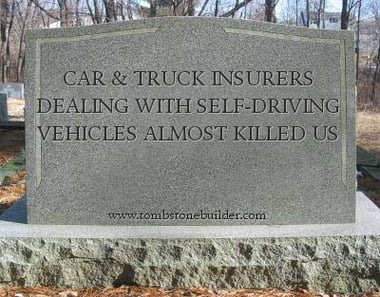It's a nice, sunny day. You're driving down the highway, windows open, wind going through your hair, singing along with Springsteen blasting on the radio. It's a great day to be alive. You see an 18-wheeler driving by in the next lane.. and all of a sudden you notice..... that there's nobody behind the wheel.. that the truck seems to be driving itself...
 No, it's not the Stephen King book/movie Christine where some kind of demonic spirit took over a '57 Plymouth Fury and started killing people at random. It's not even Herbie the Love Bug, a sentient '63 Volkswagon Beetle who'd occasionally win an auto race or two. It's a self-driving (or autonomous) truck , that can drive with no need for a driver behind the wheel. The few currently on the roads, are in test-mode, but they won't be forever.
No, it's not the Stephen King book/movie Christine where some kind of demonic spirit took over a '57 Plymouth Fury and started killing people at random. It's not even Herbie the Love Bug, a sentient '63 Volkswagon Beetle who'd occasionally win an auto race or two. It's a self-driving (or autonomous) truck , that can drive with no need for a driver behind the wheel. The few currently on the roads, are in test-mode, but they won't be forever.
It won't be long before they're on our roads and highways. In short time, it won't be surprising at all to notice that the vehicle beside you is completely driverless, perhaps with a passenger sleeping in back.
It'll be 15 years before we see any meaningful penetration of autonomous and semi-autonomous vehicles on our roads. By 2035, it's estimated that there will be 23 million fully autonomous vehicles on the road (out of a total of 250 million). By 2050, we can expect more autonomous and semi-autonomous vehicles on the road than traditional "human behind the wheel" vehicles.
 Obviously, with self-driving or autonomous vehicles (from here on to be referred to as "AV") joining the rest of us on the roads, there will be major changes. For one, parking will never be a hassle ever again - just get dumped off by your car & let parking be the car's problem, not yours. People on their way to work will have more free time to read a newspaper, watch TV or even have a short nap as their cars take the everyday trek to their job. There'll be no congestion on highways, as AVs can be programmed to safely drive mere inches away from the driver in front of them. People will no longer need a license to drive, your kids are just as likely to take the car to school as you are to work.
Obviously, with self-driving or autonomous vehicles (from here on to be referred to as "AV") joining the rest of us on the roads, there will be major changes. For one, parking will never be a hassle ever again - just get dumped off by your car & let parking be the car's problem, not yours. People on their way to work will have more free time to read a newspaper, watch TV or even have a short nap as their cars take the everyday trek to their job. There'll be no congestion on highways, as AVs can be programmed to safely drive mere inches away from the driver in front of them. People will no longer need a license to drive, your kids are just as likely to take the car to school as you are to work.
Things will change.
A study done in 2008 by the US National Highway Traffic Safety Administration found out that 93% of vehicular crashes were a result of human error. Consider that vehicle insurance is essentially the risk of covering a driver's claims and/or accidents. Actuaries at an insurance company figure out what the odds of you having an accident are and set a premium that will not only cover that risk, but make a fair profit. The higher the risk of covering you, the higher the premiums are set. Insurers are gamblers, hoping that you'll remain safe & comfty while they eagerly spend your premiums paid (after covering expenses of course).
Consider again how insurance premiums are set, it's all about risk. If the vehicles are fully autonomous, you've just removed the "human" factor from that risk. If that "human error" accounts for 93% of vehicle crashes, all of a sudden the risk of covering that person goes down considerably. With AVs on the road, it'll be safer. Not only will there be less accidents, but the severity of them will go down.
As time goes on and AVs become more commonplace, road safety will improve dramatically. With the "human" factor removed from the equation, insurance rates will start to be weighted to risk profile of the vehicle rather than the driver like it is now. With less risk, expect premiums to fall considerably.
AVs tend to be proportionally more expensive than traditional vehicles are. It's speculated that this could lead to a significant drop in private ownership of vehicles. Instead, people would start using a vehicle sharing model, since individual ownership would be cost prohibitive. With several owners of a shared vehicle, insurance costs would be divided amongst them. The current car insurance model where there's many private vehicle ownership is the bread & butter of the vehicle insurance industry. Vehicle-sharing destroys that and replaces it with a model where there's fewer premiums paid.
It's also theorized that instead of individual ownership of vehicles, that ownership will transfer over to auto manufacturers and technological companies. As mentioned, with this transition to AV vehicles, things will change.
As a result of AVs joining the marketplace, premiums go down because there's less accidents and the roads are safer. At the same time, the number of insurance premiums sold by insurers will go down considerably as people start sharing vehicles rather than privately owning and insuring individually. It's estimated that as a result, there could be as much as a $25 Billion loss by 2035 to insurers.
It should be noted that some of this loss may be offset by the fact that the cost of the average claim will go up considerably. AVs are considerably more expensive than traditional vehicles, so any damage to them will tend to be costlier. With larger possible claims, the risk of covering goes up, as do premiums.
Insurers are all about calculating risk. This is a situation, where everything is unknown, at best - they're guessing. For vehicle insurers, this must be a scary time.

Will self-driving vehicles kill vehicle insurers?
Like any other company facing change, especially technological, those who adapt and evolve will survive, possibly end up leaders in their field. Those that don't, will have nobody mourning for them. Other quicker, smarter, more aggressive companies will gladly fill in their place. They'll be but a memory.
How will Insurers survive the AV APOCALYPSE?
For those insurers who remain, they're going to have to fight for a piece of the shrinking market. They'll have to change how they think and their business models, they'll have to adapt... or die.
- Become experts in big data & analytics: for insurers being able to play effectively in the AV market means being able to control the data generated by AVs and communication softwares that support them. Those that do collect, organize and analyze this data will have distinct advantages over those who don't. In insurance, information is the key. Insurtech companies like Baseline make it easy to do things like this. Baseline offers you tools like Drivn & Behaev which compiles driving data via telematics and allows you to analyze it and get insights about the risks of covering drivers.
- Insurers can develop the needed actuarial framework and models necessary to deal with insuring AVs.
- They can explore their partners eco-system and collaborate with automakers, providers of communication and software systems, as well as government at multiple levels.
- They can explore new and different business models they normally wouldn't consider. For example, instead of using the traditional business model of insuring many small risks,why not try covering just a few large risks (with a much larger premium resulting).
In the end, car insurance won't die, it'll just become something different. How that impacts insurers, clearly depends on what they do in response to it happening.